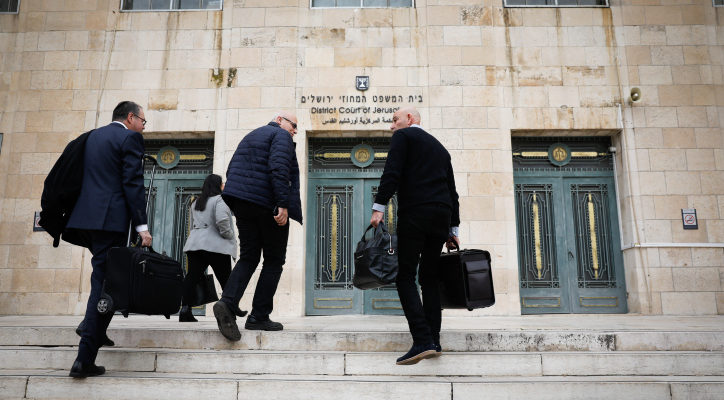The multiple stages of the trial from Sunday’s reading of the indictment through preliminary arguments and hearing the evidence against the prime minister means it may be three years before a verdict is rendered.
By Paul Shindman, World Israel News
The trial of Prime Minister Benjamin Netanyahu opens on Sunday, but it will take up to three years of hearings on three different charges before the three judges issue their verdict.
Proceedings at the Jerusalem Magistrate Court begin Sunday afternoon with the reading of the indictments on fraud, bribery and breach of trust against Netanyahu and the three other defendants — Shaul and Iris Elovitch and Arnon Mozes. The trial itself will be complicated and does not involve Netanyahu alone, so there are numerous teams of lawyers involved.
The legal procedures alone can take months for each phase of the trial. Immediately after the charges are read there is likely to be a defense request for postponement of the trial for up to another year over technical issues.
If there is no delay, the second phase of the trial will involve the defense teams making preliminary claims and this can take from six months to a year, Israel Hayom reported. The defense will be given 60 days to file its claims to which the prosecution will be given another 60 days to answer. Only then will a date for hearing and a decision be taken in court. At this stage, the judges will ask the parties to open their calendars and set dates for begin hearing the evidence.
There are three different charges involved. The first, known as Case 1000, alleges Netanyahu and his wife received illegal gifts from several wealthy acquaintances. Case 2000 involves recorded conversations between Netanyahu and Yedioth Ahronot newspaper owner Arnon Mozes in which Netanyahu and Mozes discussed legislation that could harm Yediot‘s major competitor, the Israel Hayom daily funded by Netanyahu’s American friend Sheldon Adelson.
Case 4000 alleges that Netanyahu, at the time also minister of communications, pedaled influence with the Bezeq phone company in order to gain positive press coverage from the Walla news organization that Bezeq owns.
The prosecutor’s office wants the hearing to begin with Case 1000 because it has the clearest evidence and may indicate Netanyahu’s criminal conduct, then move to Case 2000 and only at the end deal with Case 4000 as it is the most complex to prove.
The Prosecutor’s Office wants to conduct an intense trial that will include three or four hearings a week, but Netanyahu’s team will try to dilute that to one hearing every week, the report said.
Only then will the third and central phase of the trial begin with the presentation of the evidence. It is expected to be the longest phase of the trial during which it should become clear where the evidence is leading and what the defendants’ situation is. During this stage if evidence is leaning towards a conviction, a plea bargain might be pursued.
The next stage is the defense phase, in which each defendant can also bring witnesses on his or her behalf. There is the potential for dozens of witnesses and the questioning and cross-examining could again take many months.
Finally, before the judges begin deliberating on a verdict the prosecution and defense will give their summaries, with each responding to the other’s claims.
So, despite the trial opening Sunday, it will most likely be several years before the judges announce whether Netanyahu and the other accused are guilty or not, and if so, to which charges.
Even if any of the charges lead to convictions, there will most likely be appeals that can also be time consuming. If the verdict is not guilty, the prosecution also has the option of appealing the verdict.
Those appeals will probably end up in the Supreme Court, a possible future stage that in itself will extend the saga beyond two or three years – possibly overlapping with a future national election. Only when the Supreme Court is finished with the appeals would anybody begin serving a sentence, if there is one.




